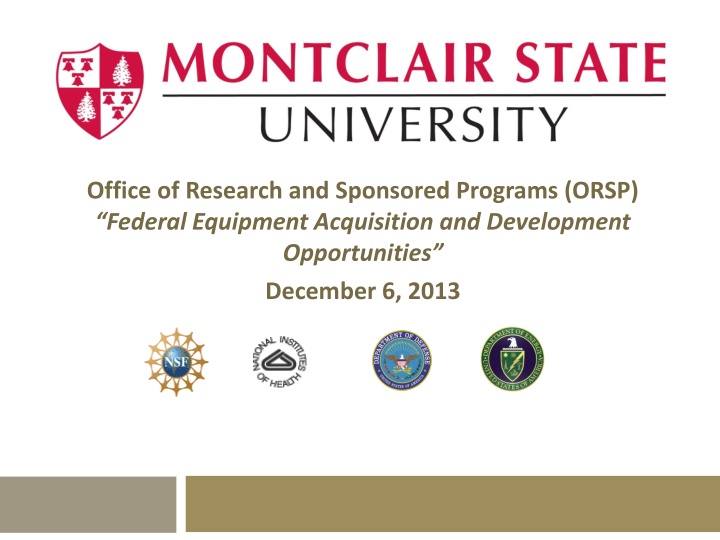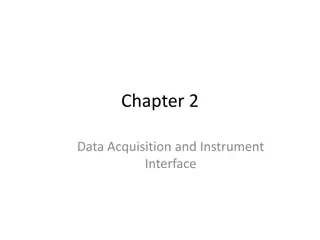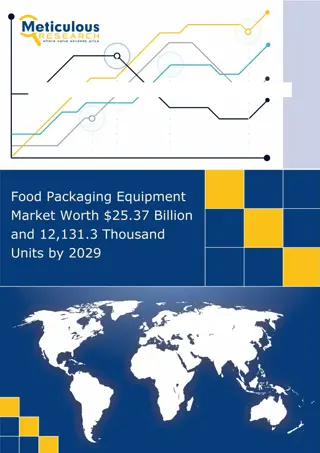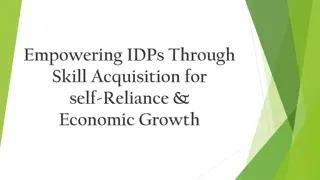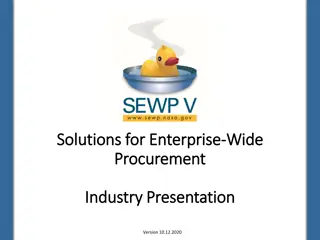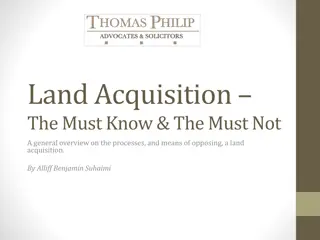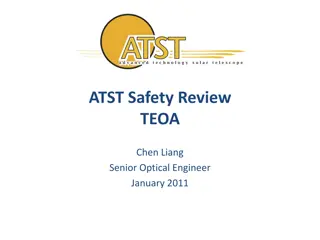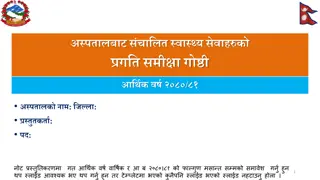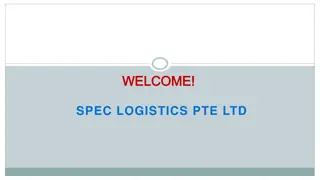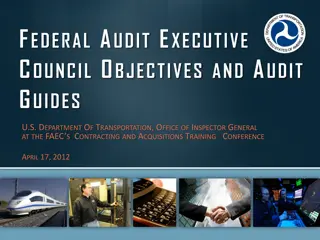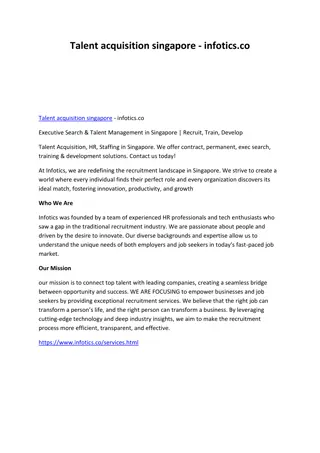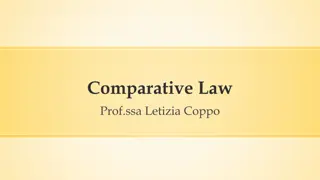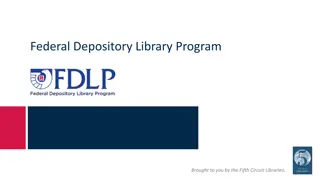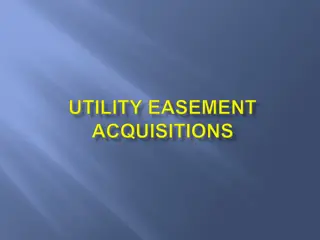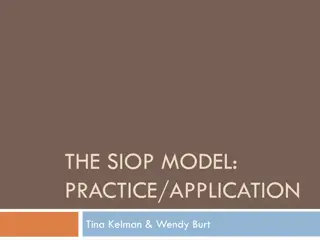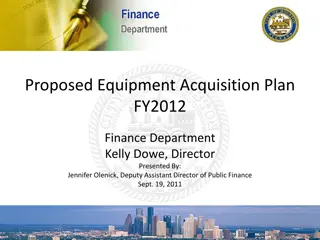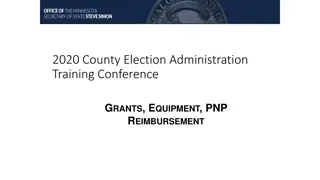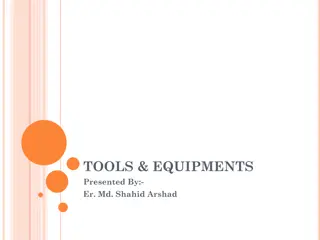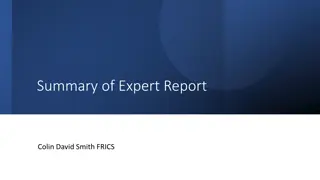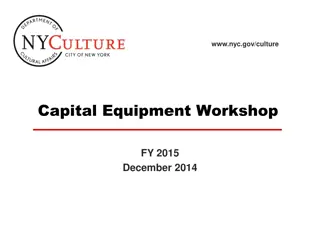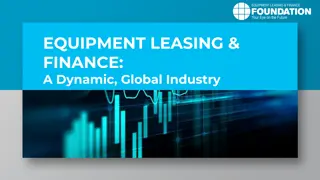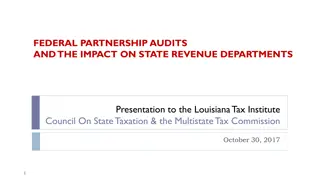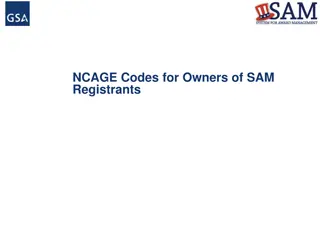Federal Equipment Acquisition & Development Opportunities
NSF Major Research Instrumentation deadline, Defense University Research Instrumentation Program details, Earth Sciences Instrumentation & Facilities support, Department of Energy Laboratory Equipment Donation Program grants surplus energy-related equipment to universities.
Download Presentation

Please find below an Image/Link to download the presentation.
The content on the website is provided AS IS for your information and personal use only. It may not be sold, licensed, or shared on other websites without obtaining consent from the author.If you encounter any issues during the download, it is possible that the publisher has removed the file from their server.
You are allowed to download the files provided on this website for personal or commercial use, subject to the condition that they are used lawfully. All files are the property of their respective owners.
The content on the website is provided AS IS for your information and personal use only. It may not be sold, licensed, or shared on other websites without obtaining consent from the author.
E N D
Presentation Transcript
Office of Research and Sponsored Programs (ORSP) Federal Equipment Acquisition and Development Opportunities December 6, 2013 nsf N I H
NSF Major Research Instrumentation 1 Deadline is January 23, 2014. Acquisition of new equipment OR development of new instrumentation. Limited to 2 (acquisition) and 1 (development). Development = Not commercially available. In-house design, requiring person-hours to build. Awards range from $100K to $4M. Non-PhD Institutions: Median award size of $246,100 in FY 12 with a success rate of ~26%. Excellent NSF presentation with MRI do s and don ts is available on ORSP s website: Submit a Proposal--National Science Foundation section.
Defense University Research Instrumentation Program 2 Look for RFP in August 2014. Expected deadline: October 2014. Awards to universities conducting, or being demonstrably capable of conducting research (with the proposed new equipment) in areas of interest to the DoD (i.e., ARO, ONR, AFOSR). In FY 14, ~$43M was available. Awards range from $50,000 to $1.5M. AVG for FY 13 DURIP winners: $277,000. Success rates ~ 15-20% (ARO, ONR). Preliminary contact with Program Officer *highly* encouraged to determine interest.
Earth Sciences: Instrumentation and Facilities (EAR/IF) 3 Supports requests for infrastructure that promote research and education in areas supported by the Division (see http://www.nsf.gov/div/index.jsp?div=EAR). EAR/IF will consider proposals for: Acquisition or Upgrade of Research Equipment: Advance laboratory and field investigations, and student research training opportunities in the Earth sciences. The maximum request is $1,000,000. The maximum request for upgrade of research group computing facilities is $75,000. Development of New Instrumentation, Analytical Techniques or Software: Extend current research and research training capabilities in the Earth sciences. The maximum request is $1,000,000. Support of National or Regional Multi-User Facilities that will make complex and expensive instruments or systems of instruments broadly available to the Earth sciences research and student communities. Support for Early Career Investigators: allows for submission of a proposal for Acquisition or Upgrade of Research Equipment that includes budget line items associated with support of a new full-time technician who will be dedicated to manage the instrument(s) being requested. Any request for technical support under this opportunity is limited to three years duration. The maximum request is $1,000,000. Planned research uses of requested instruments, software, and facilities must include basic research on Earth processes SUPPORTED BY THE DIVISION OF EARTH SCIENCES. Proposals requesting equipment, infrastructure, or personnel that will also serve disciplines outside the Earth sciences may be jointly reviewed with other programs within the Foundation. EAR/IF will consider co-funding of projects with other NSF programs and other agencies.
Dept. of Energy Laboratory Equipment Donation Program 4 Grants surplus and available used energy-related laboratory equipment to universities and colleges in the United States for use in energy-oriented educational programs. The listing of equipment available through LEDP is updated as new equipment is identified. It is available at no cost for a limited time and is granted on a first-received, qualified application basis. Specific items may be recalled for DOE use and become unavailable through the program after the equipment appears on the availability list.
Equipment Requests on Research Proposals 5 Keep in mind that *many* federal programs allow for the purchase of equipment provided you can justify the need and necessity, unless otherwise indicated (excluding general purpose equipment, like computers). E.g., NIH R01. Link to list of Equipment Acquisition and Development Opportunities: http://www.montclair.edu/media/montclairedu/orsp/Equi pment_Infrastructure-Grants.pdf
Technical Grant Writers/Editors 6 Pros Cons Industry knowledge: Work with many agencies, giving them insight into these agencies, as well as exposure to different ideas and trends. The consultant does not have the institutional memory of an insider. You might not pick the right person: It can be tricky finding the consultant who fits with your organization, listens well, and has the sharpest skills. Objectivity: A consultant will have a more objective view of your project s strengths and weaknesses. Consistent writing style: The final product will not look cobbled together from mismatched parts. It may cost too much: This is the most frequent reason organizations hesitate. You need to consider: What talent you have on staff (and how much time they have to devote to grant writing) The job will get done on time: Consultants could not stay in business if they did not meet deadlines. Your need for grants from a variety of sources, and what outside talent you can find at what cost You have control: You can hire the person of choice, and fire that person if the process doesn't go well. To find the right consultant you must interview several grant writers--get estimates of the overall cost, and names of former and current clients Cost savings: While consultants typically charge $60- $75/hour, you will not be paying them for a 40 hour week, or asking faculty to find time to write. Networking opportunities: Intimately involved with numerous proposers and can help connect you with potential collaborations and partnerships.
Technical Grant Writers/Editors 7 The Association of Fundraising Professionals (AFP) offers a Consultants Directory that can be searched by specialty, name, or geographic area. The American Association of Grant Professionals has a national list of member consultant services. Philanthropy News Digest provides a listing of grant writing consultants in its Classified Section. TECHNICAL WRITER DIRECTORY (NORDP) BioScripta Health Science Communications Jheri Dupart, PhD Jheri@bioscripta.com Doctorate from MD Anderson, comfortable working across biomedicine and many other fields, including infrastructure ('large, high-value') proposals. Great eye for consistency and logical presentation. Has worked as an English language editor for an overseas journal, and is great for working on writing from non-native speakers.
